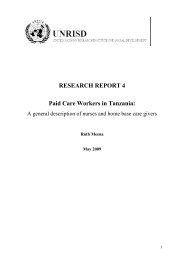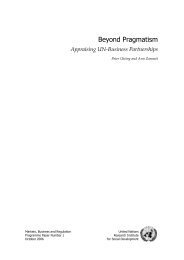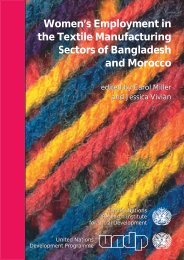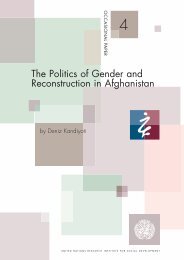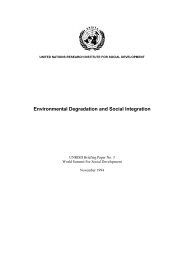communicating in the information society - United Nations Research ...
communicating in the information society - United Nations Research ...
communicating in the information society - United Nations Research ...
You also want an ePaper? Increase the reach of your titles
YUMPU automatically turns print PDFs into web optimized ePapers that Google loves.
Introduction<br />
Development, a far more attractive title. Many believe that <strong>the</strong> outcome<br />
of WSIS would have been improved had UNESCO been a co-organizer.<br />
The cultural and communication brief of <strong>the</strong> event, as well as relations<br />
with civil <strong>society</strong>, would have been enhanced <strong>in</strong> <strong>the</strong> WSIS process.<br />
Hav<strong>in</strong>g said this, WSIS has given <strong>the</strong> regrettable term <strong>the</strong><br />
“<strong>in</strong>formation <strong>society</strong>” new legs, and it appears that we must live with it<br />
for some time. This book is about <strong>in</strong>fus<strong>in</strong>g it with some of its miss<strong>in</strong>g<br />
mean<strong>in</strong>g, miss<strong>in</strong>g not only <strong>in</strong> its history but <strong>in</strong> its current <strong>in</strong>carnation <strong>in</strong><br />
WSIS.<br />
Inertia <strong>in</strong> WSIS<br />
The substantive issues raised by <strong>the</strong> WSIS process <strong>in</strong>clude some on<br />
which progress is blocked, with powerful governments ensur<strong>in</strong>g that<br />
noth<strong>in</strong>g will be done beyond confirm<strong>in</strong>g <strong>the</strong> current status quo as<br />
exercised outside of WSIS. Thus a number of “<strong>in</strong>ert” passages <strong>in</strong> its<br />
declaration are <strong>in</strong>tended as no more than markers that certa<strong>in</strong> topics are<br />
off-limits.<br />
One passage <strong>in</strong> particular goes fur<strong>the</strong>r, <strong>in</strong> that it not only reaffirms<br />
<strong>the</strong> status quo, but gives <strong>the</strong> game away as to <strong>the</strong> direction <strong>in</strong> which <strong>the</strong><br />
powers that be would like to move. This passage refers to who owns and<br />
controls <strong>the</strong> rights to use <strong>in</strong>formation, which is a key area for <strong>the</strong><br />
<strong>in</strong>formation <strong>society</strong>. A perverse notion that what we need is <strong>the</strong><br />
“protection” of <strong>in</strong>tellectual property by means of exclusive monopoly<br />
rights given to owners is pursued. A typical formula is:<br />
Intellectual property protection is essential to encourage <strong>the</strong><br />
<strong>in</strong>novation and creativity <strong>in</strong> <strong>the</strong> Information Society.<br />
However, strik<strong>in</strong>g a fair balance between protection of<br />
<strong>in</strong>tellectual property, on <strong>the</strong> one hand, and its use, and<br />
knowledge shar<strong>in</strong>g, on <strong>the</strong> o<strong>the</strong>r, is essential to <strong>the</strong><br />
Information Society. This balance is reflected by protection<br />
and flexibilities <strong>in</strong>cluded <strong>in</strong> exist<strong>in</strong>g Intellectual Property<br />
agreements which should be ma<strong>in</strong>ta<strong>in</strong>ed (Paragraph 33,<br />
Draft Declaration, 25 September 2003).<br />
Expressed like this, <strong>the</strong> idea of “<strong>in</strong>tellectual property protection” is<br />
nonsense, historically, legally and logically. Intellectual property rights<br />
(IPRs), <strong>the</strong> collective term preferred by <strong>in</strong>dustry for copyright, patents,<br />
trademarks and so on, are basically monopoly usage privileges granted<br />
by <strong>society</strong> to <strong>the</strong>ir creators (later, <strong>the</strong>ir “owners”) for a given period,<br />
before such <strong>in</strong>tellectual creations go <strong>in</strong>to <strong>the</strong>ir natural habitat <strong>in</strong> <strong>the</strong><br />
public doma<strong>in</strong>. This is proposed as a means (among several possible<br />
means) to ensure that <strong>the</strong> creative process is rewarded and <strong>the</strong>reby<br />
encouraged to cont<strong>in</strong>ue. Logically, to protect <strong>in</strong>tellectual property thus<br />
3




